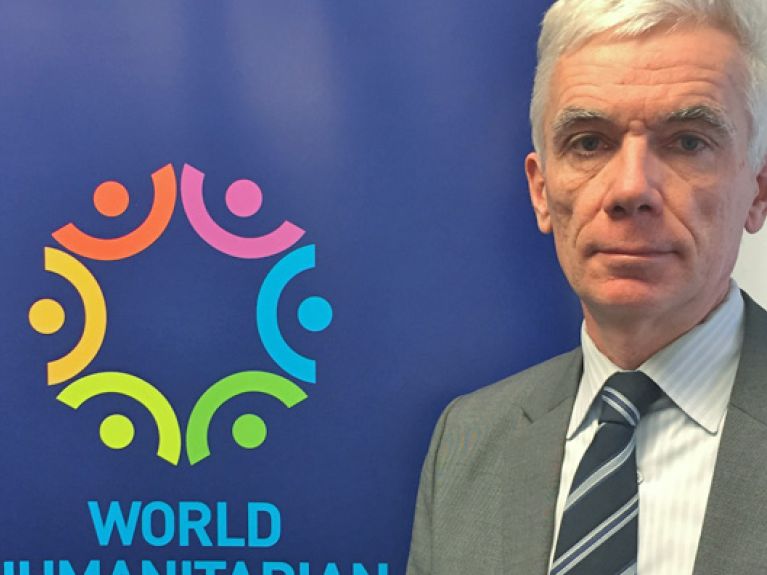“World leaders must stand behind their responsibilities”
Antoine Gérard, Chief of the World Humanitarian Summit Secretariat at the UN Office for the Coordination of Humanitarian Affairs (OCHA), talks about the meeting in Istanbul.

Mr Gérard, the first World Humanitarian Summit is taking place in Istanbul in May. Why is a new format of this kind necessary?
The World Humanitarian Summit is a one-of-a kind meeting for three, intertwined reasons:
First, this is the first time in the 70-year history of the United Nations, that a meeting of this scale and scope has been convened around humanitarian action. The world is at a critical juncture. We are witnessing the highest level of humanitarian suffering since the end of the Second World War. This is why the UN Secretary- General has convened the World Humanitarian Summit, and has called for global leadership and unity to deliver on his Agenda for Humanity.
Second, the WHS does not focus on one specific topic, but addresses a myriad of issues that will shape the way we respond to and prepare for humanitarian crises for years to come. These range from respecting international humanitarian law and humanitarian principles, to addressing displacement, to preparing for disasters, to empowering women and young people to be leaders in their own communities.
Third, both the Summit in Istanbul as well as the consultation process are involving states as well as the many other actors who are involved in delivering life-saving aid to millions around the world.
What does that mean in concrete terms?
No country or organisation can address these challenges alone. This is why, in addition to representatives from government, the private sector, civil society, crisis-affected communities, international organisations, youth, diaspora and academia will all have a place at the table in Istanbul. This format will also encourage multi-stakeholder cooperation and partnership-building. Whether through the high-level leaders’ roundtables or the side events, participants at the Summit will be encouraged to form coalitions and work together to prevent human suffering by finding concrete ways to preparing for and responding to crises.
Which results do you expect from the Summit?
The Summit will mark a major shift in how the international community prevents human suffering by preparing for and responding to crises. At the Summit, world leaders must stand behind their responsibilities to the world’s people by committing to taking forward the Secretary-General’s Agenda for Humanity. The Summit will result in a set of actions and commitments to enable countries and communities to better respond to and prepare for crises, and become more resilient to shocks. And it will chart a course for change towards a world where our commitment to our shared humanity is truly the driver of decision-making at a global level. This is the only way we can hope to alleviate the suffering of the 125 million people in this world who are in need of humanitarian assistance and protection.
The Agenda for Humanity calls upon all the world’s citizens to uphold and act upon five core responsibilities: to do more to prevent and end conflict; to uphold the rules that protect civilians in conflicts; to leave no one behind; to work differently together to end need; and to invest in humanity, both politically and financially. We hope that through the World Humanitarian Summit, the Secretary-General’s agenda will become the world’s agenda. This is not just a moral imperative, but a strategic necessity to create a peaceful and prosperous future for all humanity.
What is your assessment of Germany’s role?
Germany has been an incredibly important partner to the World Humanitarian Summit process, which says a lot. Germany plays a very important role in confronting humanitarian challenges, not only as a generous financial donor but also as an important influencer in shaping humanitarian policy and decision-making. Germany is a generous donor to the United Nations, the Red Cross/Crescent movement and to NGOs. Beyond the financial contributions, its engagement in shaping the humanitarian policy agenda has increased significantly in the last few years and continues to do so. Germany’s public advocacy is also important, especially to bring international attention to forgotten crises; to their causes and disastrous effects, and most importantly, to the needs of the people affected by them. ▪
Interview: Johannes Göbel

